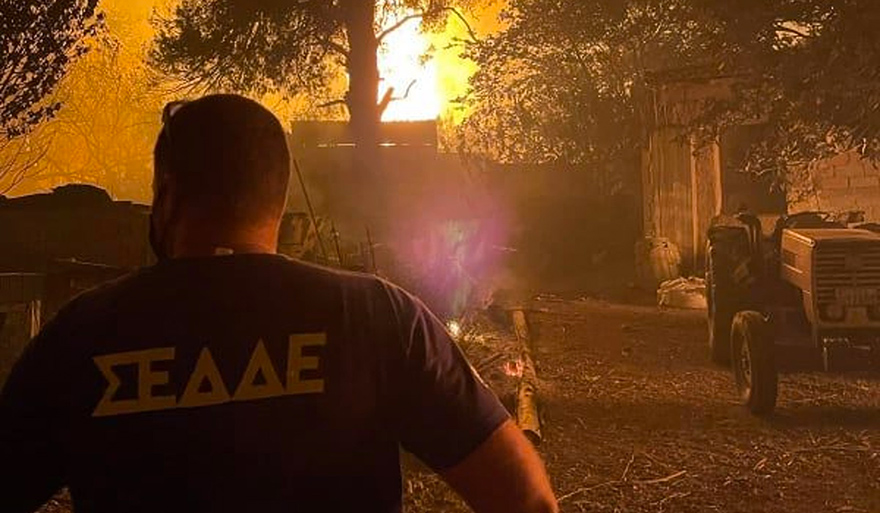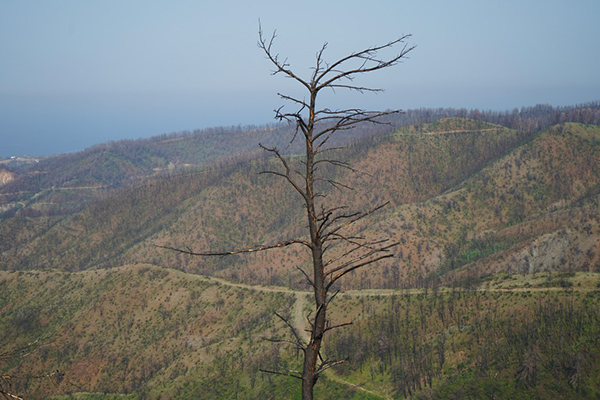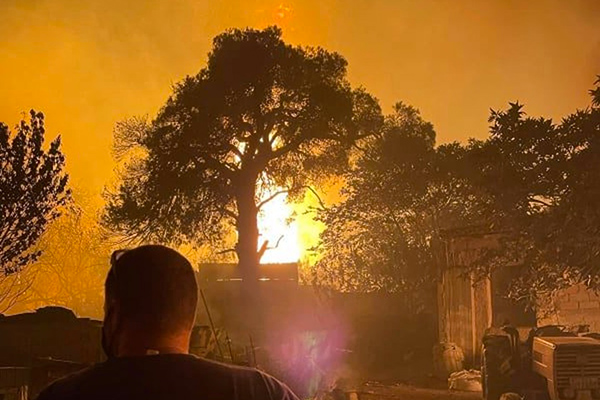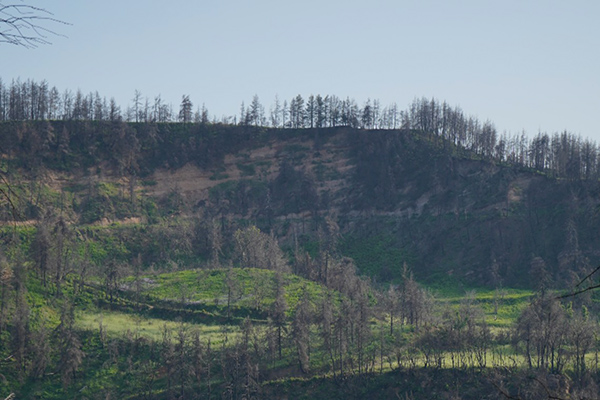Extinguish or evacuate? The dilemma of north Euboea in the face of a fiery nightmare
Can the EU provide solutions as natural disasters multiply in the midst of a climate crisis?

Euboea (Greece)
It is difficult to convey the feeling of driving through the endless burnt-out landscape in the northern part of Euboea, one of Greece’s large islands. A terrible anguish covers the blackened and deforested slopes, as for kilometres nothing can be seen but the charred stumps of pine trees. Before the fire the landscape was known for its natural beauty. Now it just looks dead.
From 3rd to 11th August 2021, a fire burned approximately 512,000 acres of land. 74.1% of this was dense forest. The destruction is unprecedented: ecological, economic, social. From the Euboean Gulf to the Aegean Sea, the fire spread rapidly and swept away everything in its path. Houses, businesses and vegetation alike.

In the village of Vasilika, located in the northern part of Euboea, Panagiotis Stamatoulas used to cultivate resin in the forest. "Every 20 days we would go, tap the pine trees and extract the resin. Everything burned. The resin was destroyed. And now our work is gone forever. The forest takes years to grow back."
The fire did not only affect resin producers but also those employed in other sectors such as olive growing, animal husbandry and beekeeping. The consequences of the disaster will therefore be felt by all the island’s inhabitants. Yannis Triantafyllou, mayor of Limni, a seaside town on the Euboean Gulf, explains: "It's not that a link in the economic chain has broken. The whole chain is in pieces. Northern Euboea accounts for 80% of Greek resin production. If the resin farmers cannot get by, how will they come here to eat, drink a coffee, call a plumber? While they suffer economically, the gulf and its towns will be brought to their knees."
Triantafyllou was on the frontline as a volunteer firefighter, and describes the dramatic scenes of those days. The government issued a general order for residents to evacuate the villages. Most decided to disobey. "I will never forget the moment when I was putting my wife and children on the ferry. All four of us were crying. I didn't want to convey what I was feeling to the children, to be seen crying. I said, ‘Take your mom to the ferry. It's gonna be okay. Daddy will stay here and save the village.’ What I felt at that moment, I'll never forget. I hope no one else feels it. I'm proud of myself and my fellow villagers for sitting tight and protecting our property. We’re proud that we didn't listen to the authorities."

The picture from the disaster scene was almost surreal: a construction vehicle is hoisting up Yannis Triantafyllou while he hoses down a roof that has caught fire. At another moment, he and a group of locals, indignant at the regular firefighters' inaction, informally commandeer a fire truck. "The lake was burning and there were no fire trucks anywhere. A kid stepped in front of a fire truck and forced the driver to stop. His father and I go in, open the fire truck's lids, take the hoses out and start putting out the fire. I tell the driver, you're not going anywhere, you're staying here. We were putting out the fire and the firemen were watching."
Triantafyllou talks much of the inaction of the fire brigade. He believes that there was an order from high up in the service to evacuate the villages and not to extinguish the fire. He says that his voluntary forest-firefighting association did not officially join the effort. "We were never called on. The local man knows the peculiarities of the forest. We are officially a part of Greece's Civil Protection, we have a registration number. But no one ever told us to do anything.” What would have happened if they had followed the evacuation order? "We would have had many more burnt houses and properties."
Residents in the village of Vasilika tell of a similar experience. They managed to stop the fire in its tracks. Burnt tree trunks still surround the village and testify to how close the flames got to the houses.
"The fire had reached the front of the houses. It stopped because we were fighting it. They told us to leave and we didn't leave. The whole village would have burned down if we had left. The houses on the beach and in the forest were burned. The fire brigade did nothing, they had orders not to enter the forest," recall residents Panagiotis Stamatoulas and George Anastasiou.
For the president of the Association of Volunteer Forest Firefighters of Prokopi village, Dimitris Vetsolouris, the fire was impossible to contain from the moment it escaped from its original source. The fire started in the municipality of Mantoudiou, near the village of Dafni. It descended towards the sea and spread to the surrounding areas. At that time, i.e. two days after the fire started, the situation was still manageable.
"The fire went down to the beach, to [the village of] Rovies. It came back, up to Dafni again. The fire was supposed to burn itself out where it originally began, except that it got out of control," says Vetsolouris. He was holding the frontline with a fire truck at a firebreak a little further north. He believes that the most important thing is prevention before an outbreak even occurs, but also "to better organize the fire department so that it can handle the severity of these incidents." He traces the beginning of the problem to the 1990s, when responsibility for forest-fire management was transferred from the forestry department to the central fire department. "All the forestry department’s expertise had to be transferred to the fire department. It didn't happen. Now that experience has been lost."

But could any system cope with such an intense crisis? Florin Kirea, of the Romanian fire department, was working in the Euboean forest as the fire raged. He gives his own perspective.
"No country in Europe could cope with fires of this scale. The firefighting system adequate for a situation on this scale would be very expensive." Romania sent 108 firefighters and 21 pieces of equipment to contribute to the effort. Indeed, EU support for Greece’s firefighting emergency was unprecedented. Through the European Civil Protection Mechanism (EUCPM), a total of 900 European firefighters, 230 machine units and 9 aircraft from 11 European countries arrived. There was also support from non-European countries. The EUCPM has set itself the ambitious goal of building an efficient system of joint civil protection inside and outside the European Union. The NextGenerationEU recovery plan dedicates around €2 billion to its operation. In particular, the EUCPM’s new rescEU reserve is a shared pool of specialised equipment for responding to various kinds of crisis including fires.
But did it work in practice? Florin Kirea describes the process. "We accepted Greece's request for help. We set up an operational team and went to Euboea. The missions were coordinated by Greek officials. The cooperation was excellent." However, as he points out, there were also challenges related to differences in technical and operational standards.
"We had different couplers and had to request compatible hoses for our vehicles. Also, the Romanian forest is different, the trees burn much more easily in the Greek forest. However, we had a briefing from the Greek fire service to understand the specifics of the forest."
The EU plans to create a crisis management system that transcends national borders. From 1 July 2022, firefighters from six European countries, including 28 Romanians with eight vehicles, will be based on Greek territory under the new EUCPM programme. If necessary, a bigger task-force will be activated to deal with a crisis. Florin Kirea considers this mechanism an important tool that will help other countries experiencing natural disasters, which are becoming worse due to climate change.
Panagiotis Stamatoulas, from the village of Vasilika, has another message. It expresses the mood of all the residents of northern Euboea. "We have lost everything, our jobs, our air, our oxygen. The forest was our life. But we will not give up. In fact, this has made us stronger. We’ll keep going."
 This article was produced as part of the Union Is Strength competition, organised by Slate.fr with the financial support of the European Union. The article reflects the views of the author and the European Commission cannot be held responsible for its content or use.
This article was produced as part of the Union Is Strength competition, organised by Slate.fr with the financial support of the European Union. The article reflects the views of the author and the European Commission cannot be held responsible for its content or use.